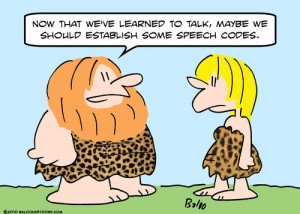In Gerry Philipsen’s Speech Codes Theory, he defines speech code as, “a historically enacted, socially constructed system of terms, meanings, premises, and rules pertaining to communicative conduct.” He placed the information of the theory into six propositions: 1) Wherever there is a distinctive culture, there is to be found a distinctive speech code (422) 2) In any given speech community, multiple speech codes are deployed (423) 3) A speech code involves a culturally distinctive psychology, sociology, and rhetoric (424) 4) The significance of speaking, depends on the speech codes used by speakers and listeners to create and interpret their communication (425) 5) The terms, rules, and premises of a speech code are inextricably woven into speaking itself (427) 6) The artful use of a shared speech code is a sufficient condition for predicting, explaining, and controlling the form of discourse about the intelligibility, prudence, and morality of communication conduct (428)
Proposition five there is a communication ritual that have four major steps. First, is initiation, which is when one mentions that they have something to talk about. Second, acknowledgment, which is when the listener is willing to sit down and talk it through. Third, negotiation, which is the talking taking place and feedback is given. Fourth, reaffirmation, which is when both the speaker and listener resolve the problem and tell each other their feelings towards one another.
This reminds me of a scene in an episode from One Tree Hill. Brooke Davis confronts her best friend, Peyton Sawyer about a boy that they both like. They talk it through and demonstrate every single step given above. There was a problem, but they resolved it through communication.





